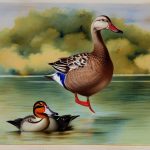The Nova Scotia Duck Tolling Retriever, also known as the Toller, is a medium-sized breed that originated in the early 19th century in the Little River District of Yarmouth County, Nova Scotia, Canada. The breed was developed to toll, lure, and retrieve waterfowl. Tolling refers to the dog’s ability to play and frolic along the shoreline to attract the attention of ducks, luring them within gunshot range for hunters. The Toller is the smallest of the retriever breeds and is known for its distinctive red coat and white markings.
The breed’s exact origins are not well-documented, but it is believed that the Toller is a mix of various breeds, including the Chesapeake Bay Retriever, Cocker Spaniel, and possibly some farm collie or Irish Setter. The breed was officially recognized by the Canadian Kennel Club in 1945 and by the American Kennel Club in 2003. Today, the Nova Scotia Duck Tolling Retriever is known for its intelligence, agility, and playful nature, making it an excellent hunting companion and family pet.
The Toller’s history is deeply rooted in its working abilities, and it has a strong instinct for retrieving and hunting. This breed’s unique tolling behavior sets it apart from other retrievers and has made it a valuable asset to hunters for centuries. The Toller’s history is a testament to its versatility and adaptability, as it has transitioned from a working dog to a beloved family pet over the years.
Table of Contents
- 1 Finding a Reputable Breeder in Maryland
- 2 The Importance of Health Testing in Breeding Programs
- 3 The Process of Purchasing a Nova Scotia Duck Tolling Retriever
- 4 Training and Socialization for Nova Scotia Duck Tolling Retrievers
- 5 The Responsibilities of Owning a Nova Scotia Duck Tolling Retriever
- 6 Connecting with the Nova Scotia Duck Tolling Retriever Community in Maryland
- 7 FAQs
- 7.1 What is a Nova Scotia Duck Tolling Retriever?
- 7.2 What should I look for in a Nova Scotia Duck Tolling Retriever breeder in Maryland?
- 7.3 How can I find a Nova Scotia Duck Tolling Retriever breeder in Maryland?
- 7.4 What questions should I ask a Nova Scotia Duck Tolling Retriever breeder in Maryland?
- 7.5 What health considerations should I be aware of when getting a Nova Scotia Duck Tolling Retriever from a breeder in Maryland?
Key Takeaways
- Nova Scotia Duck Tolling Retrievers were originally bred in the early 19th century in Nova Scotia, Canada, to lure and retrieve waterfowl.
- When looking for a reputable breeder in Maryland, it’s important to do thorough research, ask for references, and visit the breeder’s facilities to ensure the well-being of the dogs.
- Health testing is crucial in breeding programs to minimize the risk of hereditary diseases and ensure the overall health and well-being of the Nova Scotia Duck Tolling Retrievers.
- The process of purchasing a Nova Scotia Duck Tolling Retriever involves finding a reputable breeder, meeting the puppy’s parents, and discussing the terms of the purchase agreement.
- Training and socialization are essential for Nova Scotia Duck Tolling Retrievers to ensure they become well-behaved and well-adjusted members of the family and community.
- Owning a Nova Scotia Duck Tolling Retriever comes with responsibilities such as providing proper care, exercise, training, and socialization to ensure their well-being and happiness.
- Connecting with the Nova Scotia Duck Tolling Retriever community in Maryland can provide valuable support, resources, and opportunities for socialization and activities for both the dogs and their owners.
Finding a Reputable Breeder in Maryland
When looking for a reputable Nova Scotia Duck Tolling Retriever breeder in Maryland, it’s essential to do thorough research to ensure that you are getting a healthy and well-bred puppy. Start by reaching out to local breed clubs and organizations, such as the Nova Scotia Duck Tolling Retriever Club (USA) or the American Kennel Club (AKC), for recommendations on reputable breeders in your area. These organizations can provide valuable resources and information on breeders who adhere to ethical breeding practices and health testing standards.
Additionally, consider attending dog shows, events, and meetups in Maryland to network with Toller owners and enthusiasts who can provide insights and referrals to reputable breeders. Visiting local dog parks and training facilities can also be a great way to connect with Toller owners and learn more about the breed from experienced individuals.
When evaluating potential breeders, ask about their breeding practices, health testing protocols, and socialization efforts for their puppies. A reputable breeder will be transparent about their breeding program, provide health clearances for their breeding dogs, and prioritize the well-being of their puppies. It’s crucial to visit the breeder’s facility in person to assess the living conditions of the dogs and ensure that they are well-cared for.
The Importance of Health Testing in Breeding Programs
Health testing is a critical component of responsible breeding programs for Nova Scotia Duck Tolling Retrievers. By conducting health screenings on breeding dogs, breeders can identify and mitigate potential genetic health issues within the Toller population, ultimately improving the overall health and well-being of the breed. Common health tests for Tollers include hip and elbow evaluations, eye examinations, cardiac screenings, and genetic testing for hereditary conditions such as progressive retinal atrophy (PRA) and collie eye anomaly (CEA).
Health testing helps breeders make informed decisions when selecting breeding pairs, ensuring that they are not passing on hereditary health issues to their offspring. By prioritizing health testing in their breeding programs, responsible breeders can contribute to the long-term sustainability and vitality of the Nova Scotia Duck Tolling Retriever breed.
When purchasing a Toller puppy from a breeder in Maryland, it’s crucial to inquire about the health testing conducted on the parents and request documentation of clearances. A reputable breeder will be forthcoming about their health testing protocols and provide transparency regarding the health status of their breeding dogs. By choosing a breeder who prioritizes health testing, you can have confidence in the genetic health of your Toller puppy and enjoy many years of companionship with a healthy and thriving dog.
The Process of Purchasing a Nova Scotia Duck Tolling Retriever
The process of purchasing a Nova Scotia Duck Tolling Retriever involves careful consideration and research to ensure that you are acquiring a well-bred and healthy puppy. Start by reaching out to reputable breeders in Maryland who have a track record of ethical breeding practices and prioritize the health and well-being of their dogs. Schedule visits to meet with potential breeders in person, allowing you to assess their facilities, interact with their dogs, and ask questions about their breeding program.
During your interactions with breeders, inquire about the health testing conducted on their breeding dogs, socialization efforts for their puppies, and any available documentation on clearances and pedigrees. A reputable breeder will be transparent about their breeding practices and provide comprehensive information to help you make an informed decision when selecting a Toller puppy.
Once you have identified a reputable breeder and selected a Toller puppy, be prepared to complete an application or contract outlining the terms of the purchase. This may include spay/neuter agreements, health guarantees, and expectations for responsible ownership. Additionally, be prepared to provide information about your lifestyle, living situation, and experience with dogs to ensure that you are a suitable match for a Nova Scotia Duck Tolling Retriever.
Training and socialization are essential aspects of raising a well-behaved and balanced Nova Scotia Duck Tolling Retriever. As intelligent and energetic dogs, Tollers thrive on mental stimulation and physical activity, making training an enjoyable experience for both the dog and owner. Start training your Toller puppy early with positive reinforcement techniques, such as treats, praise, and playtime, to establish a strong foundation of obedience and good behavior.
Socialization is equally important for Tollers to ensure that they are comfortable and well-adjusted around people, other animals, and various environments. Expose your Toller puppy to different sights, sounds, smells, and experiences from a young age to help them develop confidence and adaptability. This can include visits to dog-friendly parks, pet stores, obedience classes, and interactions with other well-mannered dogs.
Enroll your Toller in obedience classes or training programs in Maryland to provide structured learning opportunities and socialization with other dogs. Professional training can help refine your Toller’s obedience skills, address any behavioral challenges, and strengthen the bond between you and your dog. Consistent training and socialization efforts will contribute to a well-rounded and well-behaved Nova Scotia Duck Tolling Retriever that is a joy to have as a companion.
The Responsibilities of Owning a Nova Scotia Duck Tolling Retriever

Owning a Nova Scotia Duck Tolling Retriever comes with various responsibilities to ensure that your dog receives proper care, attention, and training throughout their life. As an active and intelligent breed, Tollers require regular exercise to maintain their physical health and mental well-being. Plan daily walks, playtime, and interactive activities to keep your Toller engaged and stimulated.
In addition to exercise, provide your Toller with a balanced diet tailored to their nutritional needs as an active breed. Monitor their weight and adjust their food intake as needed to prevent obesity and maintain optimal health. Regular veterinary care is essential for routine check-ups, vaccinations, parasite prevention, dental care, and early detection of any health concerns.
Tollers thrive on companionship and interaction with their owners, so allocate time for bonding activities such as training sessions, playtime, and quality time together. Mental stimulation through puzzle toys, interactive games, and training exercises can help satisfy your Toller’s intelligence and prevent boredom or destructive behaviors.
Lastly, responsible ownership includes providing a safe and enriching environment for your Toller at home. This includes secure fencing in your yard, safe toys and chews, comfortable bedding, and a designated space for your Toller to rest and relax. By fulfilling these responsibilities as a Toller owner in Maryland, you can ensure that your dog leads a happy, healthy, and fulfilling life as part of your family.
Connecting with the Nova Scotia Duck Tolling Retriever Community in Maryland
Connecting with the Nova Scotia Duck Tolling Retriever community in Maryland can provide valuable support, resources, and camaraderie for Toller owners and enthusiasts. Join local breed clubs, such as the Chesapeake Area Nova Scotia Duck Tolling Retriever Club (CANDTRC), to network with fellow Toller owners, participate in events, and access educational opportunities related to the breed.
Attend dog shows, trials, and events in Maryland that feature Nova Scotia Duck Tolling Retrievers to meet other owners and learn more about the breed from experienced individuals. These gatherings can offer insights into training techniques, health care tips, breed-specific activities, and opportunities for socializing your Toller with other dogs.
Engage with online forums, social media groups, and websites dedicated to Nova Scotia Duck Tolling Retrievers to connect with a broader community of Toller enthusiasts across Maryland and beyond. These platforms can be valuable sources of information on training advice, health care recommendations, breed-specific products, and shared experiences with fellow Toller owners.
Consider participating in Toller-specific activities such as agility trials, obedience competitions, hunting tests, or dock diving events in Maryland to showcase your Toller’s abilities while bonding with other owners who share your passion for the breed. These activities can provide enriching experiences for both you and your Toller while fostering connections within the local Toller community.
By actively engaging with the Nova Scotia Duck Tolling Retriever community in Maryland, you can access support networks, educational resources, and opportunities for shared experiences that enhance your journey as a Toller owner while contributing to the collective appreciation of this unique breed.
If you’re a Nova Scotia Duck Tolling Retriever breeder in Maryland, you understand the importance of providing the best care for your dogs. Just like how poultry owners need to ensure the well-being of their birds, you know that proper nutrition and housing are essential for your beloved retrievers. In fact, you might find some useful tips on poultry care and coop management from Poultry Wizard’s article on what to feed ducks. Taking inspiration from different animal care practices can help you enhance the health and happiness of your furry companions.
FAQs
What is a Nova Scotia Duck Tolling Retriever?
The Nova Scotia Duck Tolling Retriever is a medium-sized breed of gundog known for its distinctive red coat and playful nature. They were originally bred in the early 19th century in the Little River District of Nova Scotia, Canada, to lure and retrieve waterfowl.
What should I look for in a Nova Scotia Duck Tolling Retriever breeder in Maryland?
When looking for a Nova Scotia Duck Tolling Retriever breeder in Maryland, it’s important to find a reputable breeder who prioritizes the health and well-being of their dogs. Look for breeders who are registered with the American Kennel Club (AKC) and who provide health clearances for their breeding dogs.
How can I find a Nova Scotia Duck Tolling Retriever breeder in Maryland?
You can find Nova Scotia Duck Tolling Retriever breeders in Maryland by searching online for breeders in the area, contacting local breed clubs or rescue organizations, and attending dog shows or events where breeders may be present.
What questions should I ask a Nova Scotia Duck Tolling Retriever breeder in Maryland?
When speaking with a Nova Scotia Duck Tolling Retriever breeder in Maryland, it’s important to ask about the health and temperament of their dogs, their breeding practices, any health clearances they provide, and the support they offer to new puppy owners.
What health considerations should I be aware of when getting a Nova Scotia Duck Tolling Retriever from a breeder in Maryland?
Some health considerations for Nova Scotia Duck Tolling Retrievers include hip dysplasia, progressive retinal atrophy, and autoimmune conditions. It’s important to ensure that the breeder provides health clearances for their breeding dogs to minimize the risk of these health issues in their puppies.
Meet Walter, the feathered-friend fanatic of Florida! Nestled in the sunshine state, Walter struts through life with his feathered companions, clucking his way to happiness. With a coop that’s fancier than a five-star hotel, he’s the Don Juan of the chicken world. When he’s not teaching his hens to do the cha-cha, you’ll find him in a heated debate with his prized rooster, Sir Clucks-a-Lot. Walter’s poultry passion is no yolk; he’s the sunny-side-up guy you never knew you needed in your flock of friends!







